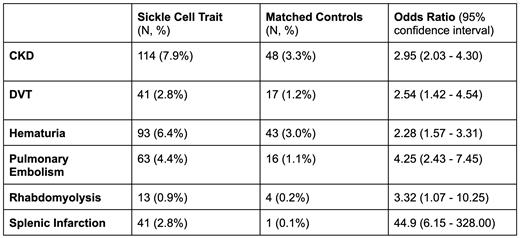Background:
Sickle cell trait (SCT) is a common condition affecting more than 300 million individuals worldwide and 3 million in the United States. Although generally believed to be an asymptomatic condition, there is growing data to suggest potential associations with morbidity, including risk for venous-thromboembolic events and chronic kidney disease.
Methods:
We conducted this retrospective cohort study using electronic health record data from the University of Colorado Health Data Compass data warehouse. Patients with a coded diagnosis of SCT were analyzed for SCT-related clinical outcomes compared against a 1:1 randomized matched sample of controls without a history of SCT (matched on age, race, sex). Individuals with sickle cell disease, Sickle-cell/Hb-C disease, sickle-thalassemia, other sickle cell disorders, and hemolytic anemias were excluded from both case and control groups. Outcomes included chronic kidney disease (CKD), deep vein thrombosis (DVT), pulmonary embolism (PE), hematuria, rhabdomyolysis, and splenic infarction. Multivariate logistic regression was used to examine the association of each condition based on SCT carrier status, adjusting for age, sex, and race.
Results:
We included 1447 SCT patients with complete demographic data, along with 1447 matched controls (n = 2894). There were 1019 (70.4%) women and 428 (29.6%) men in each case and control group. A majority (72.7%) were black or African American. The median age of the cohort was 36 years (IQR = 28 - 47). We found significant associations for CKD (OR = 2.95, 95% CI: 2.03 - 4.30), DVT (2.54, 95% CI: 1.42 - 4.54), PE (OR=4.25, 95% CI: 2.43 - 7.45), and hematuria (OR= 2.28, 95% CI: 1.57 - 3.31). (Table) Despite few overall events and wide confidence intervals, association remained significant for rhabdomyolysis (OR=3.32, 95% CI 1.07 - 10.24) and splenic infarction (OR=44.9, 95% CI 6.15 - 328.00). Male sex was strongly associated with splenic infarction (OR = 8.70, 95% CI 4.11 - 18.41) and rhabdomyolysis (OR = 19.14, 95% CI 4.35 - 84.18).
Conclusion:
In this case-control cohort study we found significantly increased risk for CKD, DVT, PE, hematuria, rhabdomyolysis, and splenic infarction for patients with sickle cell trait with odds ratios similar to those seen in other study cohorts. The significant morbidity associated with this common genotype warrants further research into primary prevention of SCT associated adverse outcomes.
Disclosures
No relevant conflicts of interest to declare.


This feature is available to Subscribers Only
Sign In or Create an Account Close Modal